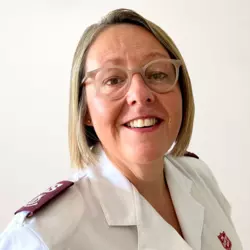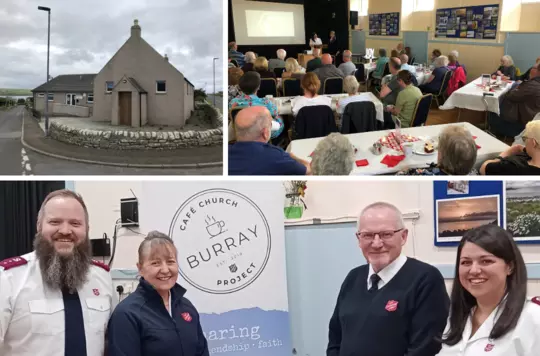8 June 2024
A joyful fellowship
Major Ali Stone
Major Ali Stone reminds us that what we believe is seen in how we live together.
Key text
The year is 1966 and there’s a hit song in the charts that will go on to feature in a 2001 film starring a green ogre and a singing donkey. It begins: ‘I thought love was only true in fairy tales/ Meant for someone else, but not for me./ Love was out to get me/ That’s the way it seemed./ Disappointment haunted all my dreams.’ Whether Neil Diamond’s song performed by the Monkees or the film Shrek comes to mind, the lyrics of ‘I’m a Believer’ might be familiar to many. But are we sure of what we believe?
I once did some work with some street pastors. Everyone in the group had to be able to articulate, in just 60 seconds, what they believed and why. Then, while out late at night on the streets of the city, they could bring that into their conversations with the people they encountered.
What did the followers of Jesus in the early Church believe? The opening verse of our study passage shows us they believed that learning was a key activity: ‘They devoted themselves to the apostles’ teaching.’
The Salvation Army has 11 doctrines, which all begin with the words ‘we believe’. You can find them on page 426 of The Song Book of The Salvation Army. Do they reflect what you believe?
Pause and reflect
- When was the last time you learnt something new about your faith?
- What was it and how have you used it in your life?
The new believers were like sponges, wanting to learn all they could about Jesus. But what exactly did the apostles teach? Peter, in his preaching at Pentecost, taught about what Jesus did, what it meant and how Jesus was the revelation of God come down to Earth as a man. So, the apostles taught unadulterated Jesus, not only who he was but also what it meant to live in relationship with him within the fellowship of the believers’ community.
The first verse of our study passage tells us that the believers believed in community or, specifically, ‘fellowship’. The Greek word koinonia not only means fellowship, but also partnership, the share that someone has in anything, a gift jointly contributed, a collection or a contribution. This is not simply sharing time together – it is a shared commitment to an important task.
Koinonia is sacrificial fellowship where everyone looks out for each other rather than being blinded by their own needs. We can find real joy for ourselves when we look to the needs of others rather than our own, as we realise that we are united by the same God, the same Lord and Saviour and the same Holy Spirit.
Pause and reflect
- When was the last time you sacrificially gave of yourself in fellowship with others?
- Do you find sharing with others to be something that energises or exhausts you?
- Do you freely share your experiences so others can benefit? How do you feel if you do this?
Verses 42 and 46 speak about ‘breaking bread’. Many scholars believe this relates to the Lord’s Supper. Clearly, sharing food together – whether in large or small groups – was something the first believers felt was important.
In recent years, the idea of small groups has become popular in churches and might perhaps be seen as a new expression of worship. Yet, here we read that the first believers met in small groups as well as in corporate gatherings and shared in faith-based teaching over food.
Pause and reflect
- When was the last time you shared in food and faith with others?
These first Christians believed in prayer, which led to everyone being ‘filled with awe at the many wonders and signs performed by the apostles’ (v43).
Prayer is a great leveller. It doesn’t matter what our ethnicity, age, sexuality or culture is; God wants to hear from us. God welcomes all his children and shows us what we need to know when it comes to equity and diversity. God loves us all.
Pause and reflect
- How do you feel about loving those who are different, or who have different beliefs to you?
- How could you make steps to embrace people you find it hard to love?
Verse 45 tells us the believers ‘sold property and possessions to give to anyone who had need’. Yet the very next verse tells us ‘they broke bread in their homes’. Therefore, if some still had their homes, not all the believers necessarily sold everything they had. However, all of them would have been taught that they should be good stewards of all God had given them and to give to those in need.
Pause and reflect
- Read the story of the rich young ruler in Mark 10:17–27.
- How would you feel if God called you to give away your possessions?
- How might you feel about selling your most treasured possession?
Ultimately, I think these verses tell us that the first followers of Jesus believed in a joyful Church.
They felt joy in all they did. They exhibited excitement and an openness to learning something new, never thinking they knew it all but always eager to learn from others. They experienced joy in having a loving fellowship with God and with each other. This was exemplified by their active prayer life, joy in worship and time spent sharing food and possessions.
Do our Army fellowships reflect these things? If not, why not?
Perhaps if our corps were more like the fellowships of the first believers, the Lord would add to our numbers daily those who were being saved.
Bible study by

Major Ali Stone
Chaplain, Villa Adastra Care Home
Discover more

Ahead of the UK general election on 4 July, Captain John Clifton encourages people to register to vote.

Salvationist discovers how corps are boldly exploring creative avenues of ministry.

Captains John and Rebecca Mitchinson explain how the corps is going from strength to strength.

